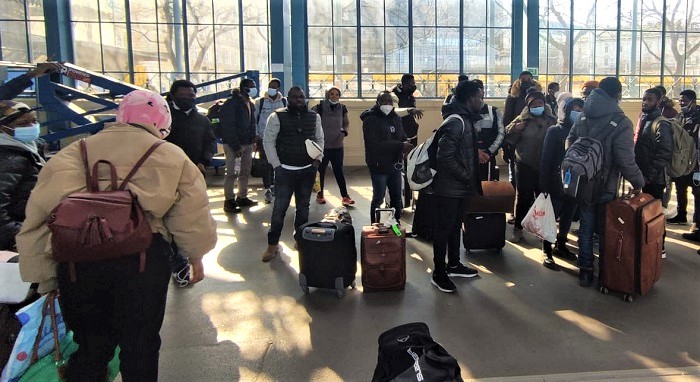On page 828 of the book, Revitalising Mission and Missiology: The Way Forward in the Twenty-First Century (2021), the author (myself) discusses the need for the church to intentionally extend its missionary activities to refugees. Among other reasons for this clarion call is the current global refugee crisis and the need to reiterate the call for Christians to reflect on the situation.
A cursory observation indicates that the gospel has always thrived either during or after many of the socio-political crises in the world, especially when the church prudently plays her prophetic role in the face of these crisis situations. The displacement of people as a result of socio-political instabilities and conflicts (something we do not anticipate) has become widespread in our world today, making it imperative for the church to explore a pragmatic response to the situation.
The Situation of the Current Refugee Crisis
There are four questions that every person needs to answer in the light of our discussion in this article. How many people are currently forcibly displaced from their geographical roots? What are their places of origin? What are their conditions of living in their current places of abode? To what extent are their cultural and belief systems affected as refugees? These four questions are critical in our discussion, particularly in the context of the call for the church to develop a missional response to the situation.
As of the year 2021, the United Nations High Commissioner for Refugees (UNHCR) estimated that about 84 million people have been forcibly displaced from their original places of abode out of whichover26.6 million are refugees, with half of these numbers being young people under 18 years. The report indicates that these figures are the highest on record since the Second World War. In addition, it is the first time that about one out of 95 people in the world has been forcibly displaced from their original homes and this must be a cause for concern.
The report further states that 35 million children are among the globally-displaced persons; one million children were born as refugees, while 4.3 million people are estimated to be stateless. The UN defines a stateless person as someone who is not considered as a national by any State under the operation of its law. According to the report, the number of internally-displaced people was 4.4 million while asylum seekers were 4.4 million people. These people have difficulty in accessing certain basic social amenities such as good healthcare, education, and employment – they are naturally vulnerable people in society.
The numbers of refugees and all displaced people keep rising in the face of increasing trends of persecutions, conflicts, political instabilities, violence, extreme poverty, human rights abuses, and harsh climatic conditions. The UNHCR reports that countries like Afghanistan, Syria, South Sudan, Venezuela, and Myanmar are on record to have contributed to more than two-thirds of all refugees abroad. Observably, this record does not seem to adequately consider most of the internally-displaced refugees in many Asian and African countries.
The recent war in Ukraine has exacerbated the situation, adding to the call for the church to see the gravity of the problem on hand and the need for a relevant and rapid response to the global refugee crisis. While we admit the effort of the UN Agency for Refugees and other stakeholders in addressing this situation, there is an urgent need for the church to also develop a comprehensive intervention programme both as part of its social responsibility and as a prophetic role to humanity. It must also be a pragmatic response to its missional call and an approach to fulfil its mission mandate.
The Social Responsibility of the Church
The church exists in society and its major clients are the diverse people who form the nucleus of every society, including those displaced from their original places of abode. The social needs of these people must always be a major concern to the church. It is against this backdrop that I ask this rhetorical question: In which way can the church be a major partner in the global response to and management of the refugee crisis?
While the clarion call of this discussion is for the church to have its in-house refugee management mechanisms, the overwhelming conviction is that The UN Agency for Refugees and other stakeholders in the management of refugee crises in the world may have to leverage on the influence and credibility of the church as their critical partners. In other words, the church must not be left out in managing the refugee crisis or addressing critical social problems. For example, during the peak of the COVID-19 pandemic, the prophetic roles played by the churches in Ghana, in partnership with the Government attest to the conviction that there are credible churches that can be significant partners in addressing the world refugee crisis.
A Wake-Up Call to the Church
The recent phenomenon of high refugee crisis in the world should be a wake-up call to the church to embark on viable and relevant mission strategies appropriate for refugees of varied social backgrounds. Instead of sending goodwill messages to people who have been forcibly displaced from their homes, or giving them temporary relief packages, the church needs pragmatic and well-organised programmes to address their situation. This is crucial because life as a refugee can be very perplexing for a person to cope with.
The person is a victim of forcible displacement, alienation, humiliation, and deprivation of their normal livelihood. They may have lost not only their original homeland, but also their loved ones, cherished property, comfort, and their way of worship, leading to the loss of their “spiritual security.” Their journey to the refugee camp—their new place of abode—may be full of sorrow, frustration, distress, and despair. This emotional trauma comes from how they were displaced.
Reflecting on the circumstances around their forcible displacement, refugees are sometimes full of anger, bitterness, anguish, and can be unforgiving. They always perceive people to have been the cause of their predicament and, therefore, wish they could settle scores with those perceived to be the cause of their problems. Settled in their new places of refuge, they ponder possible answers to unending questions passing through their minds, even as they wish to experience the benevolence and care of the right persons in their moments of despair. In their situation of helplessness, powerlessness, and sobriety, they are always ready for messages of hope from benefactors, and this is where the church must stand in the gap. The church has the Good News of Jesus Christ and must make it accessible to refugees and everyone with diverse social and spiritual needs.
The Church’s Missional Role
Mission to refugees must be one of the most significant missional praxes in contemporary mission and should, therefore, not be neglected by every mission-minded church, because the prospects are high for mission to thrive among refugee communities. When people’s hope is dashed, they turn to whatever can make them survive in comfort. The church must not leave refugees to struggle to survive or restore their lives outside godly principles and values.
While humanitarian agencies concentrate more on meeting the basic needs of the refugees as well as ensuring that they are psychologically settled, some of the agencies seem to lose sight of teaching them to forgive the wrongdoing of their assailants, which is the bedrock of peace. Even if this is part of the humanitarian services, it may not be as effective as that which the church can offer, because Christ whose values and principles are espoused in the church has everlasting peace for the world. Jesus says, “I have said these things to you, that in me you may have peace. In the world you will have tribulation. But take heart; I have overcome the world” (Jn. 16:33, NIV).
The seeming insignificant effort of the church in managing the global refugee crisis may have given the devil his “field day” to influence the lives of innocent people among the various refugee communities in the world. Christians must understand that an intervention of social needs for destitute people cannot be an ultimate solution to their problems, but when the gospel is brought into the picture, the narrative changes positively. This is because the gospel brings peace and salvation, making the issue of salvation very paramount.
The ultimate goal in mission to refugees is to transform their lives with the gospel even in their state of despair. The displaced person tries to “forget” many things about their place of origin, including some aspects of their culture and religion and is always optimistic that “everything” found at the destination will be “manna from heaven”.
This explains why some refugees, even after peace and stability has been restored in their places of origin find it difficult to return. At times, some of them who feel nostalgic of their home of origin but may still consider it challenging to decide whether to return or keep staying in their displaced condition.
The ultimate decision that refugees can make to restore their hope in life is to be introduced to the gospel for the grace of the Lord of refuge to give them an everlasting hope. The Psalmist’s description of God as our refuge and our very present help in time of trouble, provides the locus of this section of our discussion: “God is our refuge and strength, a very present help in trouble. Therefore, we will not fear, though the earth should change and though the mountains slip into the heart of the sea; though its waters roar and foam, though the mountains quake at its swelling pride” (Psalm 46:1-3, NASB).
The inference is that providing social needs to refugees should not be the only missional strategy of the church, but also making them to come to the saving knowledge of our Lord Jesus Christ, the refuge and fortress of humanity. God cares for all, including people in distress such as refugees, stateless people, and asylum seekers. Hence, they must be taught to understand that God can put their lives and souls in the cleft of rocks and protect them with His right hand (Ex. 33:22), irrespective of their predicament. With this understanding, the church’s mission to people in distress must go beyond mere distribution of physical necessities to the vigorous propagation of the gospel with the aim of winning them for Christ.
Special Missionaries to Refugees
Specially-trained missionaries are required to minister to refugees, for their work needs conversional approaches. The church needs a strategy that can safeguard the lives of the missionaries assigned to this task because it is a very complex and sophisticated mission. The church may consider other issues like the method of raising financial support for the mission, arranging an effective dialogue with the various stakeholders managing the refugees, and identifying the nature of humanitarian assistance needed for the mission.
Due to the complexity of this task and the involvement of several agencies with diverse worldviews and ideologies, the church may have to establish an in-house research unit to investigate the realities about refugee management from the Christian perspective. This unit can be of a great help to advice the church on how to approach the situation in the light of the activities of different religious organisations and ideological movements with the same mission to the refugees.
Generally, refugees may have come from diverse social backgrounds with their cultural perspectives as well as worldviews, which are likely to change due to their situation. Their interest in life and religion may not be the same as their previous way of living. To some of them, they need a Saviour while others may feel “disappointed” in anything about religion and seem to blame every person, even including God for allowing their predicament to occur. For this reason, churches considering mission to refugees ought to organise pre-mission field training activities for their missionaries and must observe conventional tactics in ministering to the refugees.
Missionaries to refugees need quality holistic training that can equip them to be successful in their mission, otherwise, considerable resources of the church may be used with little results. The missionaries are to be so versatile that they may be able to provide professional counselling and have the spiritual aptitude that is enough to support the refugees in prayer. The refugees must see such missionaries as credible “spiritual parents”. It also requires that missionaries understand international policies on refugees and the dynamics of human rights issues that may be a challenge to the mission.
Conclusion
When all is said and done, the bottom line is that the church has a mission to refugees, because in every refugee community there is a potential convert for Christ. How can this be achieved? Someone must appropriately share the gospel with that person (Rom. 10:14). The church ought to understand that whatever the challenge may be, there is the need for it to adopt relevant strategies to accomplish its mission among distressed people. Unlike other agencies which handle the social aspect of refugees, the church is the only agency capable of addressing both social and salvific needs of refugees.
While the influx of refugees into some countries is so overwhelming that the authorities are compelled to close their boarders to prevent them from entering, the grace of God is not shuttered to the refugees. The gospel, therefore, should be their ultimate hope and that is why the church must rise to the occasion and embark on effective missionary activities among refugees. The social changes taking place in our society should not be considered as absolutely disadvantageous to Christian mission, but rather the premise on which God’s love and care for humanity are well-articulated.
Written by Vincent Anane Denteh (Rev.)
Email: vadentcop@gmail.com
©2022


















